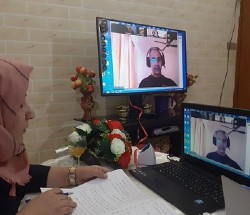Special Needs
According to the laws for people with special needs in the Republic of Iraq, and in light of our academic policies, the University of Babylon offers a range of provisions and support to students with special needs. We offer on-going advice and support from the application stage through to graduation. We can support and assist the student on a range of issues including: physical access, examination arrangements and additional learning support. In all educational programs, the university welcomes students with special needs such as learning difficulties (dyslexia, ADHD), speech disorders, autism, sensory impairments (visual, hearing), physical disabilities, mental health difficulties, chronic illnesses (epilepsy, diabetes, heart condition, brain or nerve injury), and temporary injuries. The university is committed to maintaining strict confidentiality regarding the data of persons with special needs. The academic support provided will not in any way affect the academic standards of the university, and it will not lead to any derogation or discrimination regarding the university degree granted to them.
United Nations: More than one billion people live with some form of disability, which is equivalent to approximately 15% of the world's population. It is therefore expected that 15% of university students have some kind of special needs and need some form of academic support.
The University of Babylon strives to provide equal opportunities for students with special needs to complete their study, by creating an admission channel for disabled prospective students based on their health status. However, this does not imply that there is anu form of discrimination in terms of the admission regulations, as they must meet the same eligibility criteria to enrol. These include that the applicant must have a high school diploma or its equivalent for primary studies, or the applicant must have a university degree or its equivalent for postgraduate studies. Applicants must have taken aptitude tests within the last five years at the time of submission (They can be exempted from this condition based on a letter from the National Centre for Measurement, or if the applicant is blind). The admission application should be filled in and submitted online within the specified timespan for the unified admission period. The student’s disability and health condition should not prevent them from practicing and applying the basic skills necessary and required to finish the academic program in which he was accepted. The University of Babylon also considers a number of cases of students with disabilities after the process of screening and differentiation among students applying to the university through the unified admission, to present them to the Permanent Admission Committee for consideration and evaluation separately according to the documents and reports that show the health status of the student. This will ensure the equal opportunity for students in this category who meet the admission requirements to be accepted into the available programs and majors. Students with a hearing impairment are accepted through the Higher Education Program for Deaf and Hard of Hearing Students by means of specific submission mechanisms set by the Ministry of Higher Education and Scientific Research.


With regard to admission to graduate studies, the University of Babylon works annually to allocate postgraduate admissions on both public and private admission channels to ensure that they are provided an equal opportunity to complete the higher diploma, master’s and doctorate degrees. These additional admissions often involve one or two seats in each specialization approved by the university council and as displayed on the online admission system for all postgraduate programs.